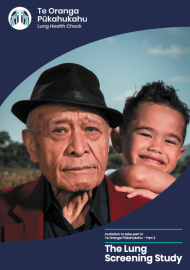Part 1 – assessment
The first part of the study is an assessment to find out if invited participants are eligible for a lung screening CT scan. The assessment involves answering some questions about personal and family health history and smoking history. This can be done online or with a nurse over the phone, by video call or in person.
If your assessment shows you are not at high risk of getting lung cancer, then you will not need a CT scan. Your participation in the study will end here. You might be offered an assessment again in the future, as your risk can change over time.
If your assessment shows you are at higher risk of lung cancer, you will be invited to have a CT scan, which is a type of X-ray. This does not mean you have lung cancer.
Part 2 – CT scan
A nurse will talk with you about the pros and cons of having a CT scan and what is involved. They will also talk about what happens if the scan finds something. This will help you decide whether or not to have a CT scan.
We welcome whānau or other support people to be involved in your lung cancer screening journey if you choose to take part. Support people are welcome to ask questions and attend any appointments with you.
If you decide to have a CT scan, an appointment will be made for a time that suits you.
Once you have had your CT scan, the pictures are sent to a radiologist who will search for ‘spots’ on your lungs (called nodules). They may also find other health issues. The radiologist will send a report to the doctors in our study.
Your GP or a nurse from your usual clinic will talk about your results either over the phone or in person.
If nodules are found, the doctors will talk through what this means and what should happen next.
Some people with nodules will have another CT scan to see if the nodule has changed. Some people will be offered other tests to see if the nodule is cancer or something else.
If anything else is found on the CT scan, we will talk to you about what this means and whether anything needs to be done.






